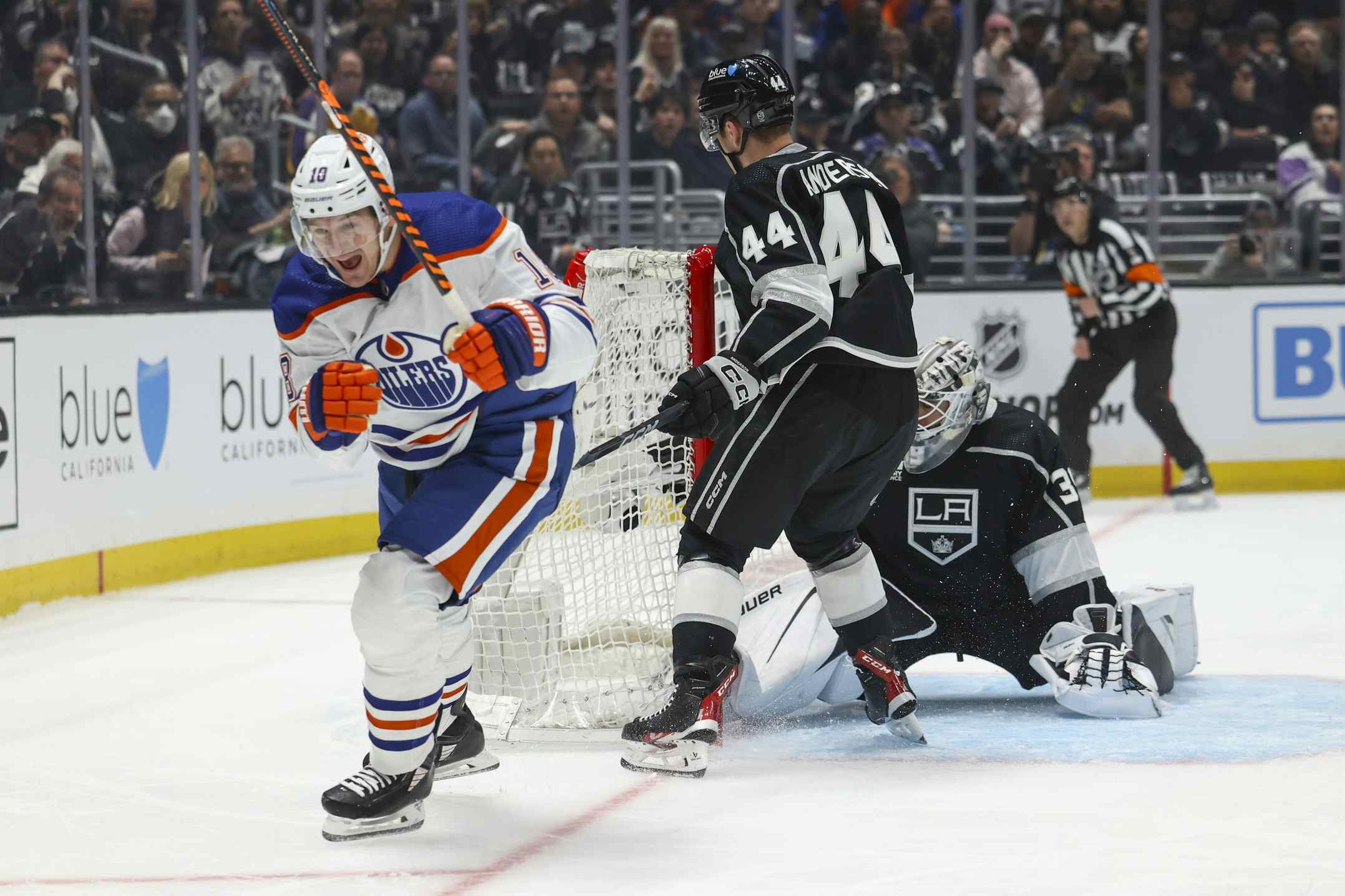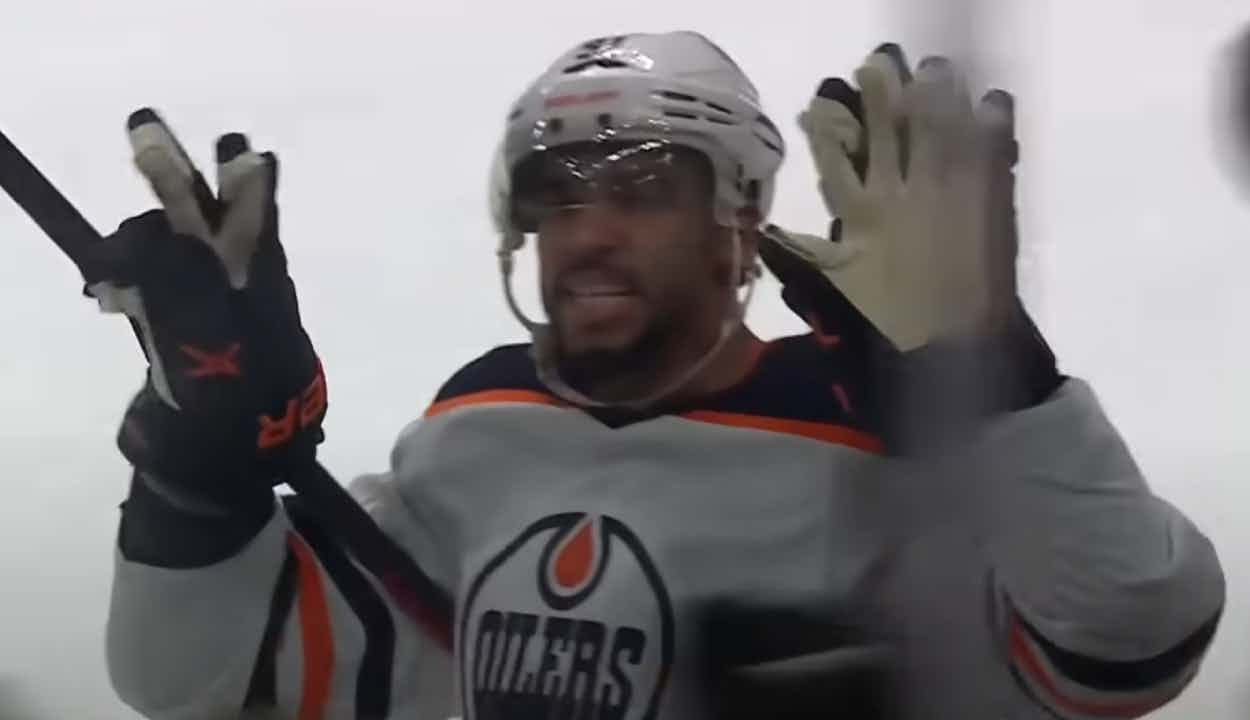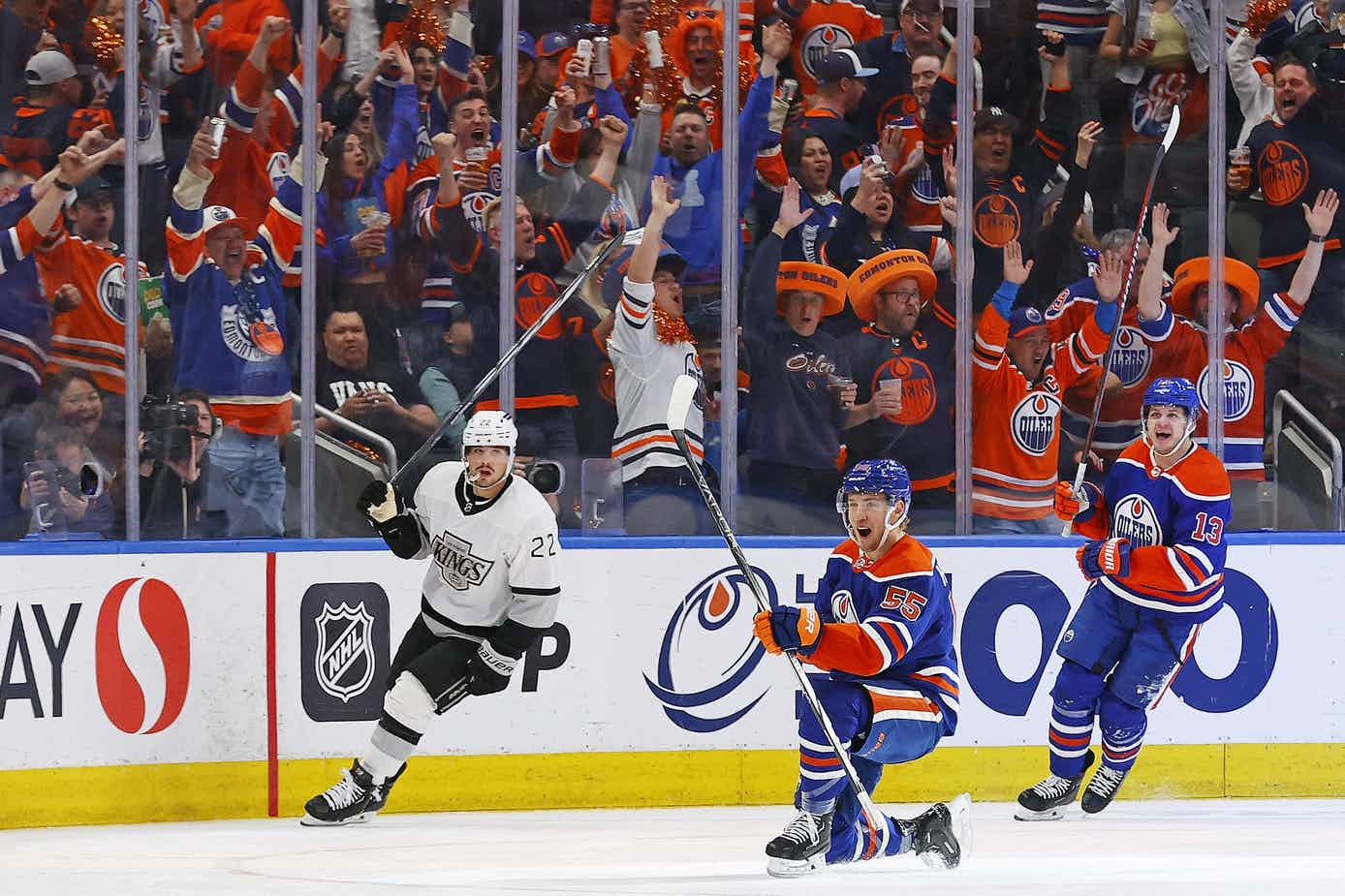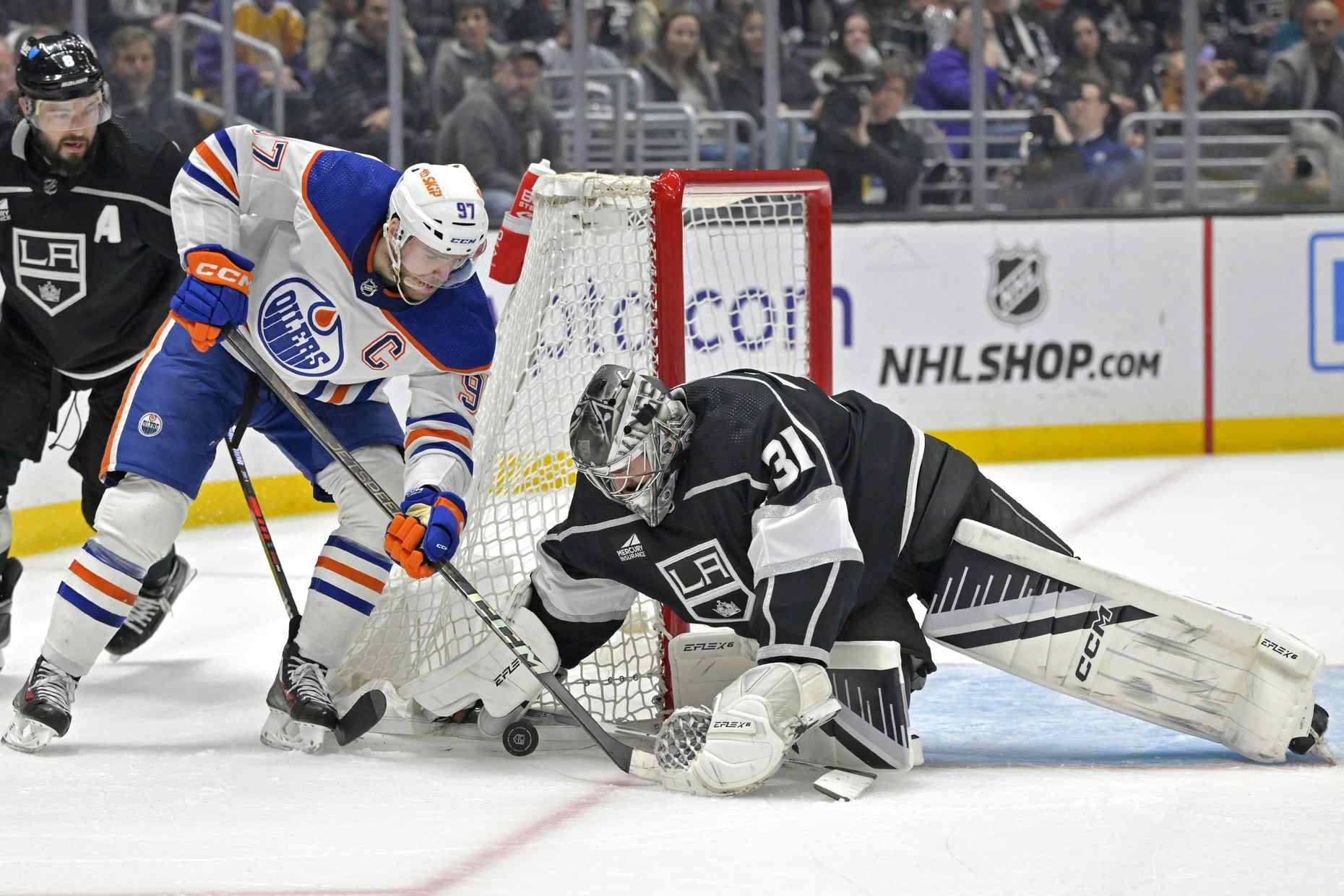FEDUN IS READY TO COMPETE
By Jason Gregor
11 years ago
Since breaking his leg on September 30th, 2011 Taylor Fedun has been working tirelessly to get back on the ice. Every since that gruesome night in Minnesota the Princeton grad has been focusing on getting back on the ice and hopefully into the NHL. Countless hours with physiotherapists, athletic therapists, chiropractors and numerous other specialists has allowed him to turn that focus into a reality.
Earlier this month Fedun took part in the Oilers annual rookie development camp, the first real opportunity for him to see how far he’d come in his rehab. He felt good off the ice, but getting on the ice against players like Nail Yakupov would be a more accurate test for the 24-year-old.
I caught up with Fedun at Capilano Rehab last Thursday, and talked about the camp, his rehab and if he feels ready to compete for an NHL job.
I caught up with Fedun at Capilano Rehab last Thursday, and talked about the camp, his rehab and if he feels ready to compete for an NHL job.
Normal
0
0
false
false
false
false
false
MicrosoftInternetExplorer4
/* Style Definitions */
table.MsoNormalTable
{mso-style-name:”Table Normal”;
mso-tstyle-rowband-size:0;
mso-tstyle-colband-size:0;
mso-style-noshow:yes;
mso-style-parent:””;
mso-padding-alt:0in 5.4pt 0in 5.4pt;
mso-para-margin:0in;
mso-para-margin-bottom:.0001pt;
mso-pagination:widow-orphan;
font-size:10.0pt;
font-family:”Times New Roman”;
mso-ansi-language:#0400;
mso-fareast-language:#0400;
mso-bidi-language:#0400;}
table.MsoNormalTable
{mso-style-name:”Table Normal”;
mso-tstyle-rowband-size:0;
mso-tstyle-colband-size:0;
mso-style-noshow:yes;
mso-style-parent:””;
mso-padding-alt:0in 5.4pt 0in 5.4pt;
mso-para-margin:0in;
mso-para-margin-bottom:.0001pt;
mso-pagination:widow-orphan;
font-size:10.0pt;
font-family:”Times New Roman”;
mso-ansi-language:#0400;
mso-fareast-language:#0400;
mso-bidi-language:#0400;}
JG: How important was that for you mentally and physically to get on the ice with some players who are going to be in the NHL next year or soon after?
TF: It was huge. Especially at this point in my rehab I’ve been in the gym for what feels like months on end. It’s important for me to get back on the ice in a relatively competitive environment and just be able to get the reps at this point in the summer.
JG: What did you notice was the biggest thing lacking for you when you got onto the ice?
TF: I think it’s still a matter of trying to get that jump back; that first couple step quickness and the multidirectional stuff. But I honestly felt significantly better as the week went on. So I think that it was an invaluable experience for me to be able to get out there.
JG: Todd Nelson told us that the first day of camp he said, ‘Fedun didn’t look at all like he did last year,’ but then by the end of the week he had noticed a significant difference. What do you think was the difference from the start to the end where you showed a significant improvement?
TF: Honestly I think a huge part of it is just getting those reps. And when you’re away from it for as long as I was, I mean I was obviously getting on the ice as much as I could, but to not be in that type of environment. And to get those valuable reps like that, it’s like anything you take time off from, when you get back to it and being not quite as sharp as you normally would. And so just going through the entire week, I think that that was huge.
JG: Did any drills give you any problems?
TF: No, I don’t think so. I really don’t think about it at all when I’m out there anymore.
JG: After the development camp, you and a few other D-men spent a week working with Steve Serdachny [Edmonton Oilers skating instructor]. What did you work on specifically in that week?
TF: It was defenseman specific sort of things. We worked on a lot of edge work and backwards skating, transition stuff where you kind of make a pass up the ice off of your back foot while you’re transitioning, a lot of dragging and shooting across the blueline trying to keep your head up. Just a lot of things specific to defensemen. And again, by the end of that week I felt even better than I did after the development week. So I think that the reps are huge.
JG: Would these types of drills be something that you would do every summer on your own anyway?
TF: Yeah, probably. Especially now that I’ve got a taste for them and seeing them from Steve. They’re definitely something that when I get an opportunity to be out on the ice that I’m going to do myself or with a few other guys, they’re something that we definitely can always work on. Regardless of whether you’re one of the best guys in the world at it or not, you can always work on it.
JG: So a lot of the fundamental drills essentially. Is this something, had you done this every summer in the past, or was this like going back in time for you?
TF: I don’t think that I had quite done that in a little while. I did work with Steve last summer quite a bit, but the specific defenseman stuff, not so much so it was really good to be able to get that.
REHAB

JG: Are you still rehabbing?
TF: I don’t think that you would call it rehabbing anymore. I’m pretty much at the point where it’s just, I’m back in the summer groove and just working out. Kind of like I would be had nothing happened. I still have to do certain things, like I have to keep on stretches to make sure that it doesn’t tighten up. And there are a few things that I have to do specifically for my right hip, but for the most part it’s more just working out.
JG: When you first broke your leg, I think it was only two weeks afterwards that they had you starting the very basics of rehab. What was the very first thing you were working on?
TF: I pretty much had everything you could think of. Honestly looking back I don’t think that there’s a technique that at one point or another that I hadn’t had. And actually it was less than a couple of weeks after.
I was still in the hospital and there were two physiotherapists who visited me and we would spend twice a day for half an hour down in the physio. And it literally just started with I would lie on the bed and we would watch my leg and I would try to fire the muscles around my knee and in my hip. And just things like my foot on the ground and trying to drag my heel to my butt, things like that that are so basic, but at a time like that that are huge to just try to get the muscles moving and to eliminate the atrophy as much as you can.
JG: So millimetres or centimetres of movement would be considered a successful day?
TF: Oh absolutely. I had a, I think it was called a continuous passive motion machine, or something like that, and my leg would go inside of that and the machine kind of bent it for me throughout the day. And so every time I went back to the rehab I would be going an extra couple of degrees that I had the day before. So it’s right out of the gate making sure that everything is taken care of.
JG: What was the most painful part of your rehab?
TF: Definitely the first week or two, that was definitely the biggest hump to get through. When you’re in a position where you are really just lying there and you’re uncomfortable. That was definitely the most difficult. Chris Davie (Oilers assistant athletic therapist) helped me a lot. Every week when the doctor told me that I could bare more weight on my leg, Chris would get out a scale and he would perform the exercise in front of me and tell me ‘look this is how much weight you are actually putting on your leg.’
So that would allow me to do it without being worried that I’d pass the threshold. Because honestly even though I was allowed by the doctor to put the weight on, it didn’t feel good to do it. And so to have that in your mind that, ‘yeah it hurts,’ but Chris helped me push that because this new movement was actually in my capable range right now.
JG: I’m sure the power of the mind plays a huge role in rehabilitation where you say to yourself, I can do this safely, and I can actually do this even though my body may not want to do it?
TF: Absolutely and that’s one of the biggest parts of having someone who knows what they are doing that can kind of coach you along the way. They can say ‘yeah this is uncomfortable or yeah it might hurt a little bit, but it’s good for you. And at the end of the day you are going to be better because you are doing this right now.’
JG: Do you think that you’re mentally stronger now because of this rehab?
TF: I think indirectly there definitely is. The power of positive thinking is unbelievable. When you’re faced with something as dramatic as a broken femur, when you look back at it and realise how important it was to stay positive I think that that will definitely help with any other bumps and bruises along the way.
MAKING A RETURN

JG: You’re done rehab and you mentioned that you’re just in a regular rotation for the rest of the summer. Do you know when the OKC camp would start if there’s no main camp in the NHL?
TF: I’m not positive. I know last year it began at the 27th or 28th of September. So I would assume that it would be within a couple of days of that one way or the other.
JG: How much are you looking forward to that first game, whether it’s pre-season in the NHL or whether it’s regular season in the AHL, whatever it is. Have you thought about that?
TF: Yeah I’ve pretty much thought about that ever since I broke my leg, that’s basically what I’ve been working towards this entire time, so it’s huge. And when I finally do get to step onto the ice I think that I’ll be really excited but it will also be a huge weight lifted off of my shoulders knowing that I’m working to get there. But once I do get there it’s far from over.
JG: You were an unknown to most Oiler fans last year when you came to camp. You had a strong camp and a strong preseason before the injury. Many were left wondering how good you could have been. How do you feel as that player in that situation thinking ‘I was so close, but now I’ve got to reprove myself and start over’?
TF: It was important that I at least had that opportunity though. Now at least I have an idea of what it takes to be there. And yeah I do kind of need to start over and do it all over again, but at least I know that I’m capable of doing that. So I’m very excited to finish off the story I guess.
JG: Did you miss hockey more than you had thought and did it almost reinvigorate you and prove how much you love the game?
TF: Very much so. From the beginning I wasn’t too caught up in it because I knew that there were so many things that I had to take care of before I was even close enough to be thinking about the games that I was missing. But now that I’m at the point where I’m on the ice, I don’t think that I’ve ever been so excited for my summer holiday to be over. I just want to get back after it because it’s been so long. I feel like I’m a lot hungrier than I’ve ever been.
JG: Are you doing a lot of one legged exercises, is that something that you do a lot of when you break your femur?
TF: I was definitely doing a lot more of that before. And then when I got to the point where my legs were a lot closer in terms of how strong they were, relative to each other then I got away from it a little bit. There’s still definitely a single leg component to our workout but it’s not nearly as concentrated as it used to be.
JG: What’s your on ice to off ice ratio right now?
TF: Right now, on the ice three times a week and then we’re in the gym five times a week and then I do an extra run on the weekend.
WRAP UP
Chatting with Fedun it was clear by the tone of his voice and the expression on his face that he’s excited about training camp and that he has found answers to his question, does chiropractic work. You can tell he has a lot to prove and his attitude is likely going to be his best asset moving forward. Realistically he’s likely to start the season in OKC, due to rust and he’s only played a handful of games at the pro level.
He’s made an amazing recovery already, but he was adamant that his journey is far from over. His goal is still to play in the NHL and I doubt anyone will question his determination or desire to fulfill it.
His story is one that I will be following closely this season, and one that every Oiler fan is hoping ends with him realizing his dream.
Recent articles from Jason Gregor





